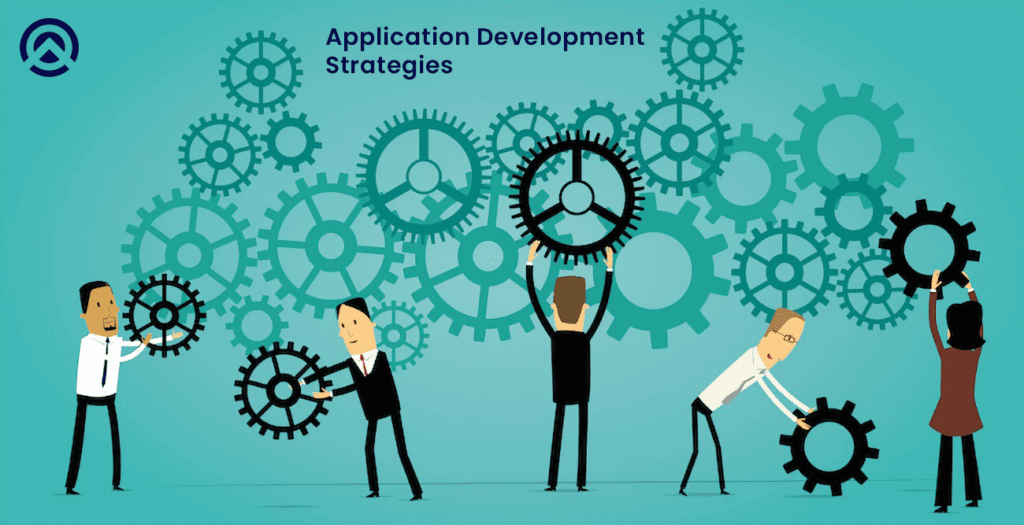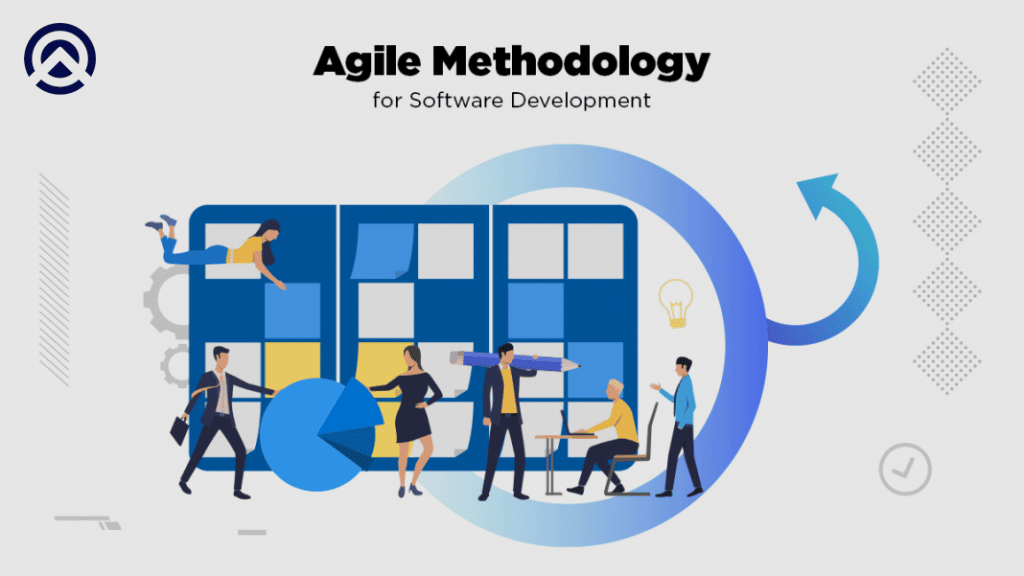In the current era, digitalization is driving the development of almost every economic procedure. The innovation of applications presented a major contribution to the development of digitalization. As per the research data of Statista, the expected revenue generation for 2023 can be 165.3 billion dollars. With the increased use of smartphones, businesses mold their services according to the demands of the public. When considering the growing demand for applications as a successful business investment, it is essential to implement a proper strategy. The follow-up of a proper application development strategy can lead to a successful completion procedure. Which can lead to better customer satisfaction and overall growth of the business.

In the course of developing an application, we take into account a range of factors beyond solely tending to customer demand. This undertaking necessitates meticulous design based on elements like creativity, strategic thinking, and technical innovations. Along with this application development practices are keen to be dynamic in nature that works with ample aspects. From a business standpoint, these aspects encompass forecasting emerging trends, responding to real-world demands, aligning with technological advancements, and navigating market dynamics. The implementation of a suitable app development strategy in a business can attract beneficial factors. Which are adaptive to the frequent nature of the marketplaces, staying at the top position of application development markets and grabbing various market opportunities.
Blog Headlines
With the exploration of this blog, our major aim is to provide accurate knowledge of the possible mobile app development strategies. By quickly reading this blog, a business can actively work toward implementing the best application. The explanation of these diverse strategies will guide and create an experience of engagement, captivation, and transformation. Viewed as a cornerstone of business growth, app development plays a pivotal role in ensuring customer satisfaction. The implementation of an accurate strategy becomes a mandatory consideration.
Exploring Various Strategies For Application Development

1. User-Centric Application Designing
The implementation of this strategy assures the integration aspects which work towards user satisfaction. Designing a mobile application with a user-centric approach can lead to different beneficial aspects when it comes to business growth. The mandatory condition of applying this strategy in mobile application development is to involve users in every step of formation. It is an iterative process in which app development takes a step forward with the validation of a user. The adoption of this strategy yields significant benefits, including heightened customer satisfaction and augmented revenue-generating criteria.
Read more: The Evolution of IT Productivity: Traditional Development vs. Low-Code/No-Code
2. Conduction of Market Research
Mobile app development is keen to be a tricky business as a newly developed application can be a top success achiever or lead toward loss. The acceptance of performing market research before going for app development can result in a penalty of positives. The condition which mandates the conduction of this research strategy is saving the app from market failure. This strategy encompasses a process wherein a thorough comprehension of the development process is acquired. The conduction of this strategy involves considering aspects like the business model of providing services, market requirement reasons for the product, and the development of an excellent marketing strategy. This research outcome provides different insights which are beneficial from the viewpoint of business.
3. Scalability Concerns
By incorporating a scalability strategy, developers can create a mobile application capable of addressing diverse challenges. One of the conditions in this scenario can be the cause of instability with an increment of users. As a solution, mobile applications are crafted using scalability practices. Application scalability entails developing a digital product at a smaller scale while incorporating all essential features. In this regard, adopting Minimum Viable Product (MVP) development is considered the most effective approach for mobile application development.
Ensuring the scalability of your application can lead to a successful business and provides an effective market position. The process of this approach involves steps like the selection of the right app development technology, and performance and load testing. In the outcome, it provides benefits like betterment of user experience, performance stability, cost-effectiveness, guaranteed project growth, and customization.
4. Development of Agile Perspectives

In the current times when an application gets launched in the marketplace and recognized due to the involvement of Agile methodology. As adoption of this strategy is now became a trend. This methodology constitutes a software development practice that factors in product-market fit and focuses on fostering iterative application growth. This strategy builds applications with advantages like the release of the product with proper market fit validation, involvement of accurate transparency in the development process, and adding continuous improvement according to new innovations.
5. Security Concerns of Confidentiality
The installation of a mobile application occurs solely when users are satisfied with the level of their data security. This aspect constitutes a significant concern for business owners and mobile app development companies alike. The development of a secure mobile application involves various practices, as detailed below. In the initial stage, this involves securing the source code of the application. Making sure to apply security practices to servers and networking connections. As they are the storing and accessing sources of any mobile application. Making sure to limit the functionality of certain functions of the app. Implementing security practices in the APIs due to the increased concerns about cyber security attacks. Addition of data security approaches with different authentication techniques. Which involves biometric authentication, security checks in data accessing, and a secure payment process. And in the last one is performing regular security testing.
Read more: Breaking Barriers with Mobile Apps: The Future of E-learning Apps Unveiled!
6. Continuous Improvement
The future growth of any mobile application is only possible when follows a dynamic nature and a user-friendly interface. The continuation of the application updates and changes makes it adaptive toward a continuously changing technical environment. The current market requirements are for an application to bugs free and acceptive of different improvements. This continuously improving practice results in growth opportunities, advancements, and the evolution of the application. This strategy revolves around gathering feedback for the developed solutions. For the same works on addressing production issues concurrently during development.
7. Strategic Markert Launch
After the completion of the product implementation, application launching becomes a major step in the product journey. Marketing is the key concept for making a product successful. The successful launch strategy for an application involves different steps which are mentioned further.
- Conduction of market research: Performed the analysis of the market.
- Buyer Persona: this states the analysis of the targeted audience and knowing their preferences.
- Opting for a pricing Model: In this various options can be chosen like making the mobile app free to access, paid, premium subscriptions, and in-app purchases.
- Initial Design and Development: In this development of the initial mobile app designing and development take place.
- Preparing Presence: public appearance matters the most and this early appearance helps inform the customers that something is coming to add ease in their lives.
- Preparing KPIs: this formation helps in product progress tracking for the completion of goals on time.
- Analysis: makes it possible to acquire the application targeting objectives. Formation of specific plans: becoming particular about the progressive growth of the mobile application.
- Beta Release: for conducting an analysis of how the final product going to perform in the marketplace.
- Final launch and promotion aspects: this works on arranging everything in one place for the launch and adds the best marketing assets for the app’s appearance.
8. Compatibility with Different Platforms

The user range for developed mobile applications is continuously increasing and has expectations to be adaptive toward different access platforms. The development of a multi-platform application is characterized by a single code that can be accessed on different mobile devices. This compatibility strategy of mobile application development can be archived with the help of different types of cross-platform development, native app development, and hybrid app development. With the use of these types, an organization can become a successful mobile application development service provider. The implementation of these techniques provides advantages like cost-effectiveness, reuse capability of the code, and time efficiency over the other approaches.
9. App Limitation in Localization or Globalization
Designers create applications to fulfill business needs or objectives and to address these requirements, they establish the criteria for application access. As every application development platform follows its accessibility guideline and for this they hold different categorizations. As these are Human Interface Guidelines (HIG), different guidelines for Android development. Development libraries like Vue and React have specific libraries to deal with the accessibility criteria. These are Rect Select and Vue Select. In some cases, the mobile app developers only follow the guidelines of the platform on which they are working. This can cause certain accessibility issues and to deal with them one can opt multi-tools approach.
Conclusive Outlines
Mobile app development is revolutionizing the future by providing cost-effective solutions that cater to diverse markets. With the increasing demand for these streamlined applications, there has been a significant rise in the number of mobile app developers and organizations specializing in mobile app development. Contrary to the challenges often associated with the early stages, numerous startup apps have managed to build a positive reputation. In the present day, startups predominantly optimize products based on this approach. In the current market landscape, creating mobile apps has become easily achievable, and businesses are capitalizing on this opportunity to address the ever-changing needs of the masses.
Amplework stands out as a reputable company holding a prominent position in the industry, boasting an extensive experience of more than 5 years. Our team has effectively completed numerous development projects, consistently exceeding the demanding expectations of our clients. Our unwavering dedication to reliability and trustworthiness has translated into an impressive revenue milestone of 200 million. Explore our website to uncover the exceptional mobile app development services we provide. Partner with Amplework to unleash the potential of state-of-the-art mobile app development services for the growth and prosperity of your organization.










